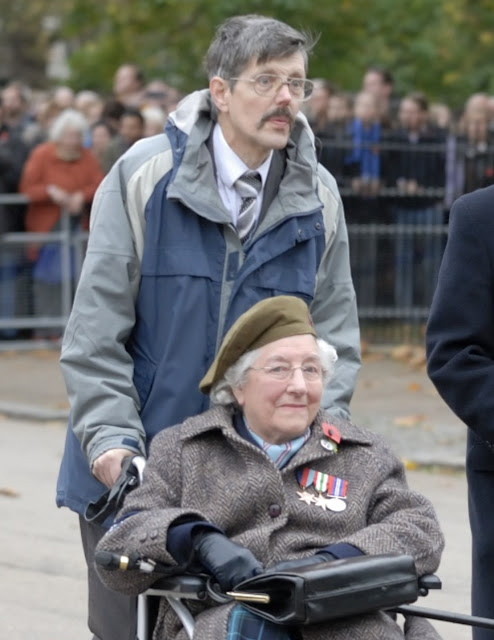Marie Scott was thirteen when WWII started and was fourteen during The Blitz. She lived with her parents and her sister in a rented flat in Clapham, south west London. Her Father was a Warden so would be out every night with his torch and his helmet.
When they heard the siren Marie, her mum and her sister would cower under the stairs until the “all clear” was given. The family had an Anderson (air raid) shelter in the garden but as the two girls feared spiders, they preferred to be inside under the stairs.
Marie Scott, said, “We did try going to the tube station at Clapham North once to shelter during an air raid, but it was so overcrowded and so unpleasant that the family decided that we would stay at home in future. If we were going to die, we decided we would prefer to do it in some degree of comfort.
The raids could last for hours and the planes would come over in waves, sometimes we might get the “all clear” and breathe a sigh of relief only for the siren to go again some twenty minutes later and we would once again make our way back under the stairs.
The raids were terrifying, you could hear the bombs falling regularly and you never knew where they were going to land. As a child, war was something that I had little concept of, but it was a nightmare with regular raids, the blackout, which was strictly enforced, food shortages, and no school. I remember vividly seeing the whole sky turning crimson when the docks were hit. The next morning the buildings were still ablaze. The war left a mark on us all that we will never get over.”
Major Ted Hunt, 101, was 21 during The Blitz and was stationed in Bromley, Kent. Before the war broke out, he had met his Swiss girlfriend Florette at school and they had shared holidays together in 1938 and 39. Florette’s Godmother Madame Bouchard, lived in Euston Square and he would visit her often to improve his language skills.
Major Ted Hunt, said. “The raids in December were particularly heavy. I was on guard duty, 24hrs on and the 24hrs off and after a particularly heavy raid at the end of December I went to Euston Square, but the house was gone. Madame Bouchard had been killed outright and her husband had been taken to a hospital run by nuns on Shaftesbury Avenue.
I went to visit him and for the first time in months he had received some post and was able to tell me that he had received the news that my Florette was to be married the following month - I was heartbroken especially as our favourite song had been J'attendrai (I will wait). The following December I met Vera, the village Baker’s daughter, and the love of my life, and we were together until she died on the 21 December eleven years ago. “
Alec Borrie was 16 during The Blitz and lived with his parents and brother and sister in Barnehurst, Kent. When the siren sounded the family would rush to the Anderson shelter in the garden, but Alec would remain in the house tucked up in bed.
Alec Borrie said, “There were a lot of incendiary bombs dropping around us which were probably intended for Vickers in Crayford. Every day after a raid my brother and I would go out to search for the biggest piece of shrapnel we could find.
The Barnehurst golf course was always getting hit and one day a German plane came down on the course. The following day as people went to scavenge someone pulled the bomb release handle and the whole plane blew up.
Another vivid memory I have is of the night the London docks were bombed and I remember being able to see, the flames of all the buildings so clearly across the river.
Alec joined Vickers and was assigned to making bomb boxes for 10lb bombs, a job he found monotonous and as soon as he was 17, he signed up and joined the army.
Mildred Schutz, 97, lived on a farm in Walton on Thames during The Blitz and remembers the sound of the anti-aircraft guns on Sandown racecourse shooting at the German planes as they made their way up London and the farm being littered with firebombs after a raid.
Mildred Schutz, said, “Our air raid shelter would often flood and then we would have to take shelter under the table in the house. We could see the glow in the sky over London a few miles away from all the fires. My father used to go up to Covent Garden market with produce from the farm at 2.00am in the morning and when he got back home, he would tell us about the devastation he had seen.”
Dick Goodwin, Vice President, Taxi Charity For Military Veterans, said, “I remember veteran Freddie Walker (who is sadly no longer with us), telling me that on the evening of 29 December the sky was so light with fires that you could have read a newspaper at 11pm.”
Dick Goodwin, continued, “This year many people across the UK feel that they will have an awful Christmas due to the pandemic restrictions but when you hear stories like these from the people who lived through WWII, I think we can safely say that on the whole we are very lucky compared with what the men, women and children endured during The Blitz.”
To find out more about the Taxi Charity visit www.taxicharity.org






No comments:
Post a Comment